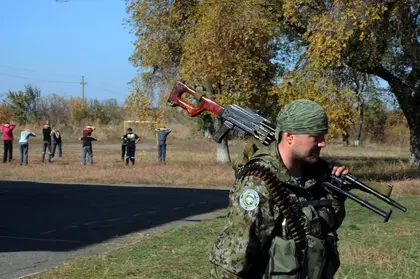The Ukrainian army succeeded in entering Ilovaisk, with a pre-war population of 16,300 people.
But the Russian forces and their separatist proxies surrounded them, and it was the start of a bloody battle that took place in a town that once was just known for its railroad hub connecting train passengers further in the Donbas and Ukraine.
JOIN US ON TELEGRAM
Follow our coverage of the war on the @Kyivpost_official.
Today, its train station is closed, and apart from wandering dogs there’s nobody.
The small town still stands on idle, but life in some way has resumed. It no longer stands on the front, and there are no separatist guarded checkpoints.
War, however, is seen everywhere in this small village as the damages of last summer have still not been restored despite claims of the Russian-separatist authorities that “humanitarian aid is provided.”
Some small shops are open, including a former ATB supermarket that has now been “nationalized” by the Russian-separatist authorities into the Donetsk National Supermarket.
A woman who only introduced herself as Lyudmila complains about the prices in the supermarket. She sits on a bench next to the small store, a few flowers in her hands that she tries to sell. Unsuccessfully. “There’s not a lot what they have, but prices have risen so high!” she said, shouting at one of the supermarket employees who stands smoking a cigarette in the burning heat.
The young man intervenes and then tells the woman “she shouldn’t complain to journalists.”
Inside the small shop – as in most other supermarkets in Russian-separatist territory – most products sold are Russian.
Because of importing Russian products, the prices of these specific goods are higher then Ukrainian products.
However, because of a lack of money among regular civilians the supermarket is not doing good business. The manager of the supermarket didn’t want to speak and demanded that that the Kyiv Post leave the supermarket.
On the sandy roads, tracks of tanks are still visible. Some burnt military vehicles and tanks stand aside the road.
A teenager rides his bicycle passed. He doesn’t pay attention to the destroyed tanks anymore.War has become part of his young life.
The boy doesn’t want to share his memories of the Massacre of Ilovaisk. “I don’t want to cry anymore,” he said with a smile.
One man in the city wants to talk about the Massacre of Ilovaisk.
His name is Vadim, a 54-year-old train mechanic, but lately he’s not working. He insisted not to publish his family name, as he explains that he does not support the Kremlin separatists.
“I was sincerely hoping that the Ukrainians were going to liberate us from that scum in August. They got into our houses, and simply demanded people to live. Of course, a lot of people didn’t do that. They simply couldn’t! But we all knew at that time that Ilovaisk would be on the frontline. Nobody of the separatist-forces tried to protect us. All they cared about was ‘killing Nazis’,” Vadim explained. “There was simply nothing. No food. No water. No electricity. We hid in bomb shelters, but many regular people didn’t live it through. They died on the hands of the people that so proudly fight ‘against fascism’.”
Talking about the Massacre of Ilovaisk makes him angry,
He remains only because he grew up in Ilovaisk.
“I’m a man. I don’t want to depend on shelters or whatever. I have a house, or well, from what is left,” he told the Kyiv Post.
The regional city administration of Ilovaisk was unavailable to respond.
A spokesperson of Donetsk’s Ministry of State Emergencies could only affirm that more needs to be done to restore the smaller, ravaged cities in the separatist-held territories.
Like in many other small villages in the separatist-held territories the life standards are low.
In Ilovaisk there is little water and electricity.
One separatist soldier who guards the street accuses the Ukrainians for cutting everything off. “If people here die of hunger, then the Ukrainians are to blame,” he said, introducing himself as Soboka.
He’s suspicious of press in the city that drew headlines internationally.
“Go away, there’s nothing to be seen here anymore,” Soboka kept saying, threateningly.
He may be right about that. Nearly a year after the murders of hundreds of Ukrainian soldiers in one of the worst defeats of Russia’s war against Ukraine, the small railroad hub city seems to be forgotten.
You can also highlight the text and press Ctrl + Enter




